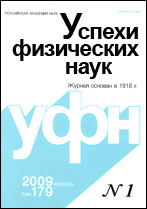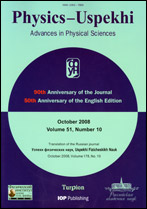|
This article is cited in 2 scientific papers (total in 2 papers)
REVIEWS OF TOPICAL PROBLEMS
Spin-fluctuation transitions
S. V. Demishevabc
a Vereshchagin Institute for High Pressure Physics, Russian Academy of Sciences, Troitsk, Moscow
b Prokhorov General Physics Institute of the Russian Academy of Sciences, Moscow
c National Research University Higher School of Economics, Moscow
Abstract:
Spin-fluctuation transitions (SFTs) are generally understood as a change in the characteristics of spin fluctuations in a magnet under the effect of control parameters (for example, temperature or composition of the material), not directly related to the formation of phases with long-range magnetic order. Therefore, SFTs in most cases go beyond the standard theory of phase transitions, where fluctuations are typically considered a phenomenon accompanying a magnetic transition. We examine the current state of the SFT issue from the theoretical and experimental standpoints, including the example of MnSi and ${\rm Mn}_{1-x}{\rm Fe}_x{\rm Si}$ helical magnets, ${\rm Hg}_{1-x}{\rm Mn}_x{\rm Te}$ magnetic semiconductors, doped compensated Ge:As(Ga) semiconductors, and a strongly correlated metal with hidden order, $\rm CeB_6$. The main methods for studying SFTs (neutron scattering and electron paramagnetic resonance) are discussed. We consider SFTs in the spin nematic phase, Ising disordered systems, paramagnetic and magnetically ordered phases, and quantum critical systems, as well as SFTs caused by changes in the spin dynamics. In discussing the SFT issue, we use the spin-polaron model, which unites objects of study that look disparate at first glance. We note that SFTs have not been studied in sufficient detail, and further research in this area may be one of the growth points in the modern physics of magnetic phenomena.
Received: January 19, 2023
Revised: April 15, 2023
Accepted: May 31, 2023
Citation:
S. V. Demishev, “Spin-fluctuation transitions”, UFN, 194:1 (2024), 23–47; Phys. Usp., 67:1 (2024), 22–43
Linking options:
https://www.mathnet.ru/eng/ufn15626 https://www.mathnet.ru/eng/ufn/v194/i1/p23
|


|





 Contact us:
Contact us: Terms of Use
Terms of Use
 Registration to the website
Registration to the website Logotypes
Logotypes








 Citation in format
Citation in format 
